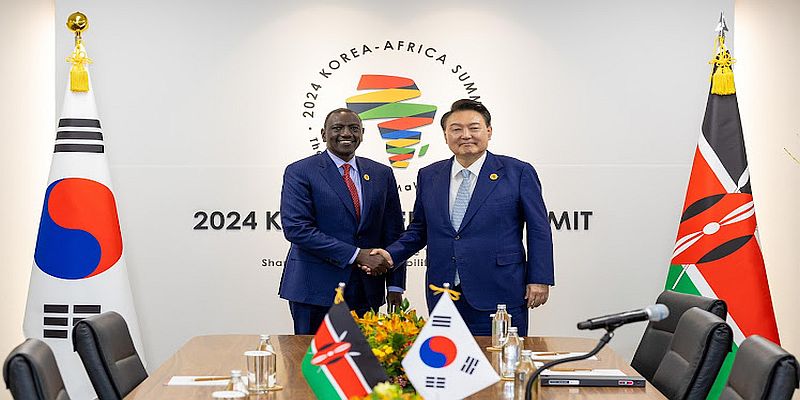Proposed Areas of Engagement for South Korea and Africa

The commitment of Korea to align its strategic policies with the African Union’s Agenda 2063 affirms our shared vision for a prosperous future based on sustainability, mutual respect and shared prosperity.
Over the years, the Korea-Africa Forum and the Korea-Africa Economic Cooperation have facilitated progressive diplomatic and economic engagements and accelerated the growth of trade and investment. At the same time, they have been pivotal in promoting development cooperation through which significant improvements in agricultural productivity, healthcare advancements and human resource development across Africa have been achieved.
Despite these gains, African nations continue to struggle against a rising multitude of complex, interrelated challenges which not only diminish our capacity to develop in accordance with our potential, they also actively undermine our investments and achievements. They include an escalating debt crisis, low access to development resources in international financial markets, high costs of this limited financing, heightened vulnerability to fluctuations in the global economy, including inflation, supply chain disruptions which take the prices of essential goods beyond reach, geopolitical crises and the negative impacts of climate change.
These challenges underscore the urgent need for a more equitable and inclusive global development financial architecture, beginning with the enhancement of contributions to the World Bank’s concessional lending window to enable African countries to effectively respond to economic shocks and pursue developmental agendas. We also urge Korea, working with the International Monetary Fund, to consider channelling Special Drawing Rights to the African Development Bank.
The vision of the Korea-Africa Summit is to bring the inspiring precedent of the Miracle of the Han River to bear on Africa's potential to generate shared prosperity for present and future generations. I therefore look forward, with great anticipation, to engaging in discussions focusing on the following key areas.
The first critical issue, with high development potential and requiring urgent attention, is food security. Africa’s rich natural resources and growing and increasingly youthful, skilled population present a significant opportunity for growth in agriculture, industry and trade. I applaud Korea’s willingness to collaborate with African nations in enhancing food production.
This support is vital and, when expanded to include the sharing of cutting-edge agricultural technology and expertise, will be transformative. Therefore, it is important that this summit point the way for initiatives like the K-Rice Korea programme, of which Kenya is an active participant, to be extended across Africa. Such programmes are not just about enhancing production but are about building capacity and transferring technology to promote sustainability and resilience, especially in light of the escalating threat of global climate change.
Secondly, I am optimistic that a primary area of focus in our deliberations shall be science and technology: To be effective and sustainable, a repositioned partnership between Korea and Africa must be intentional in harnessing the potential of the Fourth Industrial Revolution. Without a doubt, Korea’s impressive advancements in ICT, especially in the fields of robotics, biotechnology, artificial intelligence and quantum computing, can enhance Africa's capacity to undertake successful economic transformation.
I, therefore, call for a significant enhancement of technology transfer and knowledge exchange in order to empower our youth and spur inclusive economic development. Increased involvement of the private sector from both regions, through investment, will stimulate growth, create jobs and foster innovation.
The third critical area of focus is climate change. Korea’s highly developed capacity in renewable energy and sustainable technology is a vital complement to Africa's ambition to unlock its abundant resource potential, both through the continent’s incomparable green energy potential as well as the manufacturing and industrial processing of other plentiful resources by means of environmentally sustainable practices.
Together, Korea and Africa can address the challenges of climate change while pursuing economic development in a manner that respects and upholds our environmental obligations. Initiatives that promote green growth and sustainable practices within African countries are absolutely vital, and Korea’s partnership cannot be overstated.
Africa’s Agenda 2063 underscores a peaceful and secure continent as a prerequisite for economic development. As a champion for institutional reforms within the African Union, I believe that there exists a unique and historic opportunity for Korea to partner with us in a singularly impactful endeavour.
The Africa Centre for Disease Control requires strong international partnerships to deliver effectively. I am confident that with its impressive track record in healthcare and technology, Korea is an ideal partner for Africa in this endeavour.
Given these and many other expectations, Africa looks to the Korea-Africa Summit as a critical opportunity for the emergence of transformative partnerships for mutual benefit. Our shared commitment is to drive rapid transformation through sustainable growth and development, to promote trade and investment as well as technology transfer and knowledge exchange, and to collaborate in fostering lasting peace and security in our regions and throughout the world.
Finally, the African Union is discussing institutional reforms that will enable our continent to effectively engage the rest of the world. In this context, the AU will be proposing an Africa Economic and Investment Summit to be held in Africa where all partners will be invited to participate.
By His Excellency William Ruto, C.G.H., PhD;
President of the Republic of Kenya
(Excerpts from the 2024 Korea-Africa Summit)
